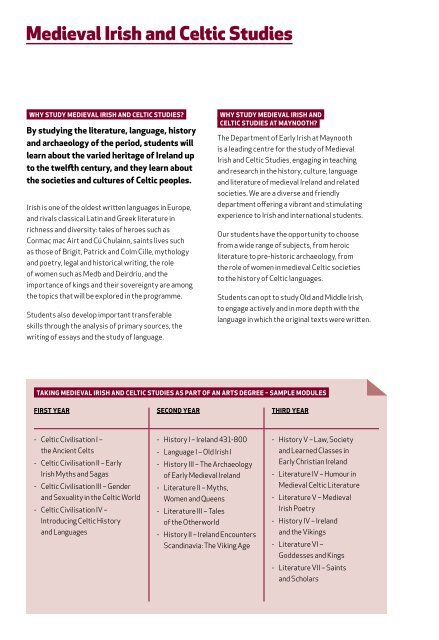Maynooth University Undergraduate Handbook 2015
Maynooth University Undergraduate Handbook 2015
Maynooth University Undergraduate Handbook 2015
You also want an ePaper? Increase the reach of your titles
YUMPU automatically turns print PDFs into web optimized ePapers that Google loves.
Medieval Irish and Celtic Studies<br />
Subject Areas at <strong>Maynooth</strong> <strong>University</strong> 124 – 125<br />
Why study Medieval Irish and Celtic Studies<br />
By studying the literature, language, history<br />
and archaeology of the period, students will<br />
learn about the varied heritage of Ireland up<br />
to the twelfth century, and they learn about<br />
the societies and cultures of Celtic peoples.<br />
Irish is one of the oldest written languages in Europe,<br />
and rivals classical Latin and Greek literature in<br />
richness and diversity: tales of heroes such as<br />
Cormac mac Airt and Cú Chulainn, saints lives such<br />
as those of Brigit, Patrick and Colm Cille, mythology<br />
and poetry, legal and historical writing, the role<br />
of women such as Medb and Deirdriu, and the<br />
importance of kings and their sovereignty are among<br />
the topics that will be explored in the programme.<br />
Students also develop important transferable<br />
skills through the analysis of primary sources, the<br />
writing of essays and the study of language.<br />
Why study Medieval Irish and<br />
Celtic Studies at <strong>Maynooth</strong><br />
The Department of Early Irish at <strong>Maynooth</strong><br />
is a leading centre for the study of Medieval<br />
Irish and Celtic Studies, engaging in teaching<br />
and research in the history, culture, language<br />
and literature of medieval Ireland and related<br />
societies. We are a diverse and friendly<br />
department offering a vibrant and stimulating<br />
experience to Irish and international students.<br />
Our students have the opportunity to choose<br />
from a wide range of subjects, from heroic<br />
literature to pre-historic archaeology, from<br />
the role of women in medieval Celtic societies<br />
to the history of Celtic languages.<br />
Students can opt to study Old and Middle Irish,<br />
to engage actively and in more depth with the<br />
language in which the original texts were written.<br />
taking medieval irish and celtic studies as part of an arts degree – Sample modules<br />
First year Second year Third year<br />
̍̍<br />
Celtic Civilisation I –<br />
the Ancient Celts<br />
̍̍<br />
Celtic Civilisation Ii – Early<br />
Irish Myths and Sagas<br />
̍̍<br />
Celtic Civilisation Iii – Gender<br />
and Sexuality in the Celtic World<br />
̍̍<br />
Celtic Civilisation Iv –<br />
Introducing Celtic History<br />
and Languages<br />
̍̍<br />
History I – Ireland 431-800<br />
̍̍<br />
Language I – Old Irish I<br />
̍̍<br />
History III – The Archaeology<br />
of Early Medieval Ireland<br />
̍̍<br />
Literature Ii – Myths,<br />
Women and Queens<br />
̍̍<br />
Literature Iii – Tales<br />
of the Otherworld<br />
̍̍<br />
History Ii – Ireland Encounters<br />
Scandinavia: The Viking Age<br />
̍̍<br />
History V – Law, Society<br />
and Learned Classes in<br />
Early Christian Ireland<br />
̍̍<br />
Literature IV – Humour in<br />
Medieval Celtic Literature<br />
̍̍<br />
Literature V – Medieval<br />
Irish Poetry<br />
̍̍<br />
History Iv – Ireland<br />
and the Vikings<br />
̍̍<br />
Literature Vi –<br />
Goddesses and Kings<br />
̍̍<br />
Literature Vii – Saints<br />
and Scholars<br />
What are my options for studying medieval irish and celtic studies at <strong>Maynooth</strong><br />
Options What you study CAO Code Points<br />
2014<br />
Medieval Irish &<br />
Celtic Studies as<br />
part of a Joint Major<br />
degree<br />
BA International<br />
meet some of the team<br />
Academics in the department are recognised experts<br />
in a range of subjects from historical linguistics<br />
to religious literature, and from archaeology to<br />
gender studies in Ireland and the Celtic World.<br />
Dr. Elizabeth Boyle joined the Department in 2013<br />
as Lecturer in Early Irish. She previously held postdoctoral<br />
research fellowships in the <strong>University</strong> of<br />
Cambridge and UCC. She is also a Visiting Fellow of<br />
St Edmund’s College, Cambridge. She studied Celtic<br />
languages, history and palaeography at Glasgow<br />
<strong>University</strong> and Cambridge (PhD 2008). Elizabeth<br />
is interested in cultural, religious and intellectual<br />
history, particularly that of medieval Ireland.<br />
You will take at least 20 credits of Medieval Irish &<br />
Celtic Studies in first year and at least 25 credits in<br />
years 2 and 3. Second and third year optional language<br />
modules are available subject to a minimum level of<br />
uptake.<br />
Students who opt to spend a year studying abroad<br />
are awarded a BA International degree. Students can<br />
make this choice during second year.<br />
What can I do with my degree<br />
Students gain a mixture of analytical skills in<br />
literature, history and language – useful assets for a<br />
variety of careers. Graduates are found in heritage<br />
tourism and related areas, library work and Irish<br />
language publishing. Some graduates opt to proceed<br />
into postgraduate study. The Department offers:<br />
ЭЭ<br />
ЭЭ<br />
ЭЭ<br />
M.LITT. (RESEARCH)<br />
MA MEDIEVAL IRISH STUDIES<br />
PhD MEDIEVAL IRISH<br />
Leaving Certificate entry requirements<br />
2HC3 & 4OD3, Irish, English and a third language.<br />
Contact<br />
MH101<br />
(page 161)<br />
MH101<br />
(page 161)<br />
Department of Early Irish (Sean-Ghaeilge),<br />
Arts Building, North Campus<br />
350<br />
350<br />
Ms. Mairéad Uí Fhlatharta, Executive Assistant<br />
Tel: +353-1-708 3666<br />
Email: earlyirish@nuim.ie<br />
Dr. Elizabeth Boyle


